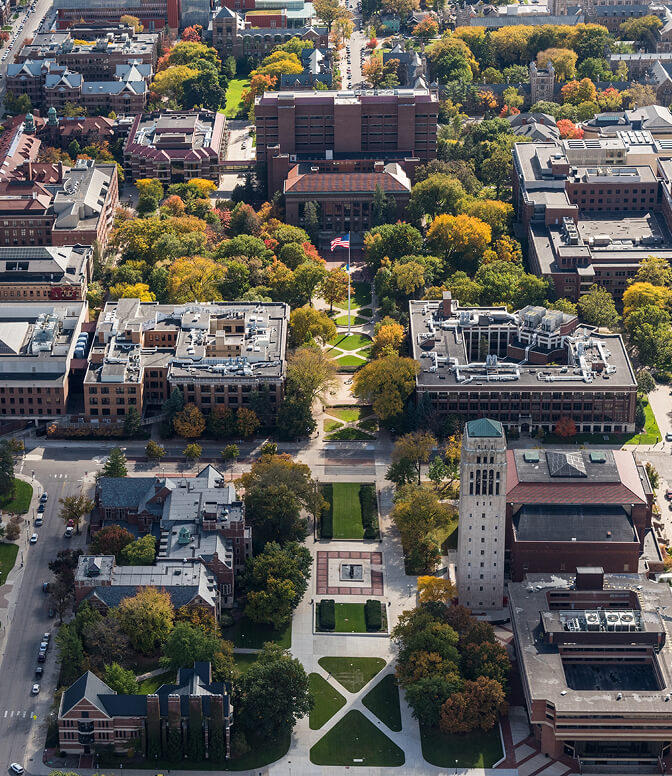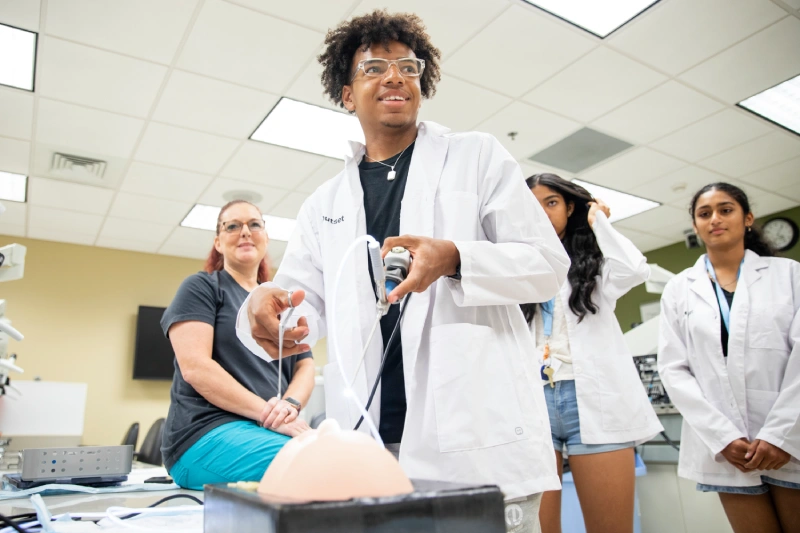Thinking about a career in healthcare? You’re looking at a field with strong job growth and countless opportunities. According to the U.S. Bureau of Labor Statistics, healthcare occupations are projected to grow much faster than the average for all jobs from 2023 to 2033, with about 1.9 million openings each year due to industry expansion and workforce replacement.
Factors Driving Growth
What's behind this rapid growth?
- Aging Population: With the baby boomer generation getting older, the demand for healthcare services to manage age-related conditions is on the rise.
- Chronic Diseases: The increasing prevalence of illnesses like diabetes and heart disease means more professionals are needed for treatment and management.
- Technological Advancements: New innovations in medical technology are creating specialties and enhancing patient care, leading to a surge in healthcare roles.
But it's not just about the numbers. It's about making a real difference in people's lives.
Importance of Starting Early
With such promising growth, starting early in healthcare sets you up for a fulfilling career. Early preparation—through education and hands-on experiences like high school medical training programs—can make all the difference.
Now, let's dive into how to start a career in healthcare by exploring various paths you might consider.
Understand the Different Healthcare Careers
The healthcare field is vast, offering a range of careers, each with unique roles and responsibilities. Whether you're drawn to patient care, research, or technology, pursuing medical careers offers numerous opportunities. Here's a glimpse of some paths to consider:
- Nurses (RNs, LPNs, CNAs): Nurses are at the heart of patient care. Registered Nurses (RNs) usually have a Bachelor of Science in Nursing (BSN) or an associate degree. Licensed Practical Nurses (LPNs) typically complete a practical nursing diploma. Certified Nursing Assistants (CNAs) undergo state-approved programs to provide basic care.
- Doctors (MDs, DOs): Physicians diagnose and treat illnesses, often specializing in areas like pediatrics or surgery. Becoming a doctor requires medical school, a residency program, and passing licensing exams.
- Physical Therapists (PTs): PTs help patients regain movement and manage pain. They need a Doctor of Physical Therapy (DPT) degree and must pass a national exam.
- Medical Researchers: If you're curious about the science behind medicine, medical research might be your calling. This path usually requires a Ph.D. or medical degree.
- Biomedical Engineers: Combining engineering and medicine, biomedical engineers design medical devices and software. A bachelor's degree in biomedical engineering is the starting point.
- Emergency Medical Technicians (EMTs): EMTs provide critical care in emergencies. There are different levels, each requiring specific training and certification.
- Pharmacy Technicians: Assisting pharmacists, these technicians manage medications and administrative tasks. A high school diploma and certification exam are typically needed to become a pharmacy technician.
- Audiologists: Specialists in hearing disorders, audiologists need a doctoral degree and state license.
And that's just scratching the surface. With so many options, there's a healthcare career that aligns with your passions and goals.
Once you have an idea of where you might fit, it's time to start preparing while you're still in high school.
Take Relevant High School Courses
Choosing the right classes in high school can give you a solid foundation for a healthcare career. Focusing on subjects like math, science, and health sets you up for success.
Key Subjects
Consider these courses:
- Algebra: Essential for problem-solving, algebra is used in healthcare for calculating dosages and analyzing data. Taking AP Algebra can earn you college credits.
- Biology: Understanding living organisms is crucial. Biology covers cell structures and systems that are the basis of healthcare knowledge. AP Biology can give you a head start.
- Anatomy: This course explores how the human body works—a must for anyone entering medicine.
- Statistics: Whether it's interpreting research studies or managing patient data, statistics is invaluable in healthcare.
These classes prepare you academically and help you develop critical thinking skills.
Setting Up for Success
Don't overlook courses that enhance communication. English classes can improve your ability to interact with patients and colleagues. Learning Spanish can be a significant asset, helping you connect with the population of Spanish-speaking patients.
By choosing your courses wisely, you're paving the way for college and beyond.
But education isn't confined to classrooms. Gaining experience outside of school is just as important when figuring out how to start a career in healthcare.
Volunteer or Intern in Healthcare Settings
Getting hands-on experience is key, and volunteering is a fantastic way to do that. By offering your time at hospitals, clinics, or nursing homes, you'll witness firsthand what it's like to work in healthcare.
Benefits of Volunteering
Volunteering doesn't just benefit others—it helps you too. People who volunteer often experience improved mental health and lower blood pressure, according to Harvard Health. You'll gain a sense of accomplishment and build confidence as you see the difference you're making.
Beyond personal growth, volunteering helps you develop essential skills for pre-meds like communication, empathy, and leadership. Interacting with patients and professionals teaches you how to navigate different situations—a crucial part of any healthcare career.
Practical Experience and Skills Development
You'll also hone practical skills that employers value. Communication is at the heart of healthcare, and so is teamwork. Dealing with real-life scenarios helps you become adaptable and solve problems on the fly. Soft skills like empathy and communication are just as important as technical knowledge in healthcare.
Participate in a Medical Summer Camp
Medical summer camps can take your passion to the next level. These camps offer immersive learning experiences where you can dive into real healthcare environments.
Hands-on Experience
Imagine watching a surgery up close, measuring blood pressure, or practicing basic medical procedures in a real-world setting. Medical summer camps offer hands-on experience that brings healthcare to life. Preparing for these programs can help you make the most of the opportunity—building practical skills, gaining confidence, and confirming your passion for the field.
Preparation and Networking
Medical camps aren't just about technical skills—they provide opportunities to meet professionals and peers who share your passion. You'll connect with doctors and nurses who can offer insights and mentorship. Plus, you'll meet other students interested in healthcare, building a network that can support you throughout your journey.
Attending a medical camp can give you a head start on your pre-med path, showing colleges and future employers that you're serious about a career in healthcare.
Shadow Healthcare Professionals
Shadowing a healthcare professional lets you step into their shoes for a day—or longer. You'll observe their daily routines, patient interactions, and the realities of working in healthcare.
Gaining Real-World Insights
By shadowing doctors or nurses, you see how they communicate with patients, make decisions, and handle unexpected situations. It's an invaluable way to understand what a career in healthcare really looks like. Plus, it can strengthen your applications to college or medical school by showing your commitment and initiative.
Finding Opportunities
So how do you start? Reach out to local hospitals, clinics, or even your own doctor. Express your interest clearly and professionally. It might take a few tries, but persistence pays off.
Before you begin, make sure you're prepared. Dress appropriately, be punctual, and bring a notebook to jot down observations. These experiences can provide great material for future applications or interviews..
Look into Certifications and Training Programs
Earning certifications in essential skills like CPR and First Aid can help you stand out. These credentials strengthen your resume and provide foundational knowledge important for healthcare careers.
You can also develop your skills through workshops and online courses that offer hands-on learning and exposure to different healthcare fields. Some programs provide mentoring opportunities to help guide you in your career exploration.
In some high schools, healthcare training is available directly through specialized courses or initiatives, making it easier to gain valuable experience. Earning certifications in areas like patient care or pharmacy services can lead to job opportunities, allowing you to gain real-world experience while continuing your education.
Prepare for College and Beyond
Planning for college is a big step, and aligning your experiences with your career goals is essential.
Start by researching colleges that offer healthcare-related majors and, if possible, visiting campuses to learn more about their programs. Some opportunities also allow you to gain valuable hands-on experience and even earn college credit.
Building a strong application goes beyond good grades. Get involved in extracurricular activities, volunteering, and leadership roles that demonstrate your commitment to healthcare. Some high school programs integrate academics with clinical experiences, helping you gain practical knowledge.
Developing key skills like communication and problem-solving is also important. You can strengthen these through activities such as debate clubs, volunteer work, or team projects.
Thoughtful planning throughout high school will help you build a strong foundation for college and a future career in healthcare.
Final Thoughts
Starting a career in healthcare as a high school student opens up a world of opportunities and sets the stage for a rewarding and impactful profession. By exploring different healthcare careers, gaining hands-on experience, and pursuing relevant coursework, you’ll position yourself for success in this rapidly growing field.
Whether through volunteering, certifications, or shadowing professionals, each step you take will bring you closer to your goal of making a real difference in people’s lives. With thoughtful preparation and dedication, you'll be well on your way to a fulfilling healthcare career.









.jpg)




.png)








